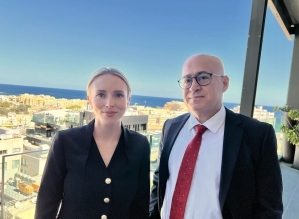
Türkiye's highest judicial body, the Constitutional Court, on June 7 upheld the government’s expulsion of nine foreign Christians in what rights advocates said was an effort to rid the country of Christianity.
The majority in the court ruled that the rights of the Christians were not violated when the government issued them N-82 codes barring them from entering or remaining in the 99-percent Muslim country as alleged “risks to national security,” according to legal advocacy group Alliance Defending Freedom (ADF) International.
“The government’s discriminatory targeting of Christian religious workers in Türkiye, all of whom have peacefully lived in Türkiye for many years, constitutes a clear violation of both the European Convention on Human Rights and the international covenants to which Türkiye is a party,” said Kelsey Zorzi, ADF International’s director of advocacy for global religious freedom, in a press statement. “It has become increasingly clear as a growing number of foreign Christians are deemed national security threats each year that Türkiye is systematically trying to extinguish Christian beliefs inside its borders.”
She said ADF International would to take the cases to the European Court of Human Rights.
“International human rights defenders are losing hope that justice will be found within Türkiye,” she said. “But the European Court of Human Rights gives hope to the human rights defenders who have been working on these cases for many years.”
Zorzi criticized the court’s decision on the cases as “clear, widespread, and systematic violations of the right to religious freedom and respect for family and private life.”
The court failed to recognize that the decision to categorize peaceful religious work as “a menace to public order and security” without proof was a direct violation of the Christians’ religious freedom, she added.
The nine religious workers were among 30 foreign Christians receiving such N-82 codes from authorities, according to ADF International.
The ruling marked the first time the high court has made a joint ruling on separate N-82 code cases, the group stated. Most significantly, ADF International noted, it was the first time that the Constitutional Court has been divided on N-82 code cases.
“There is no concrete justification provided in either the administrative or judicial processes in the concrete case to suggest that the applicants’ activities pose a threat to public order or security,” said dissenting Judge Zühtü Arslan, former president of Türkiye’s Constitutional Court. “Conversely, it is impossible to categorically and abstractly regard the ‘missionary’ activity directed at the applicants as a threat to public order or security.”
Attorney Can Kurtulan, representing several of the applicants, expressed concern about the implications on religious freedom in the country.
“With this decision, the prevailing local jurisprudence that ‘missionary activities fall within the scope of freedom of religion and thought but can be restricted within legal limits’ has been effectively nullified,” he said.
The attorney added that the court gave no reason for the imposition of the N-82 codes, and the matter must be referred to the European Court of Human Rights.
Orhan Kemal Cengiz, another lawyer representing the workers, said the court’s opinion had contradictions, as dissenting judges pointed out.
“Despite the clear evidence that these foreign individuals were expelled due to their alleged missionary activities, the majority of the court failed to see any infringements on freedom of religion,” Cengiz said. “It is undeniable that the applicants were unable to access the content of intelligence reports during their trials before the administrative courts. As a result, they were unable to present arguments against their expulsion, which violated their rights under article 1 of Protocol 7 of the European Convention on Human Rights. Clearly, these applicants’ right to freedom of religion and their right to family and private life have been violated.”
Christian Daily International has previously reported about the issues faced by foreign church workers in Türkiye.





